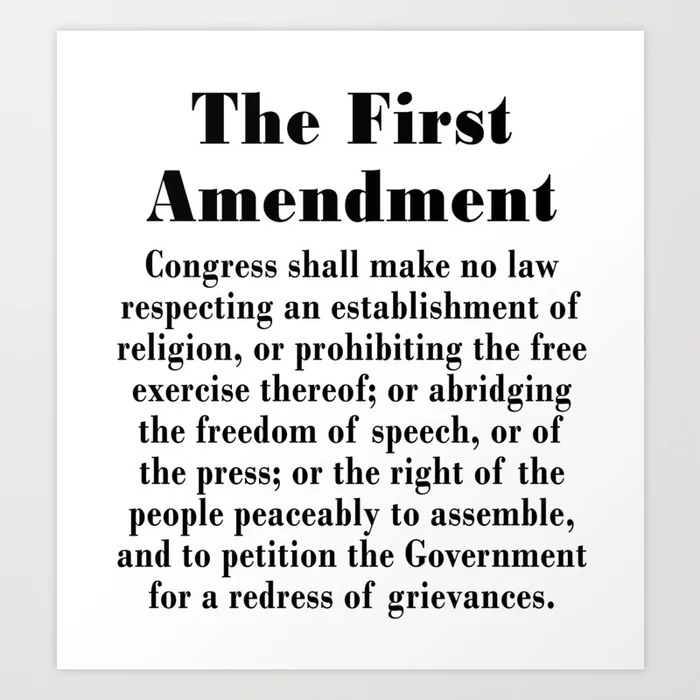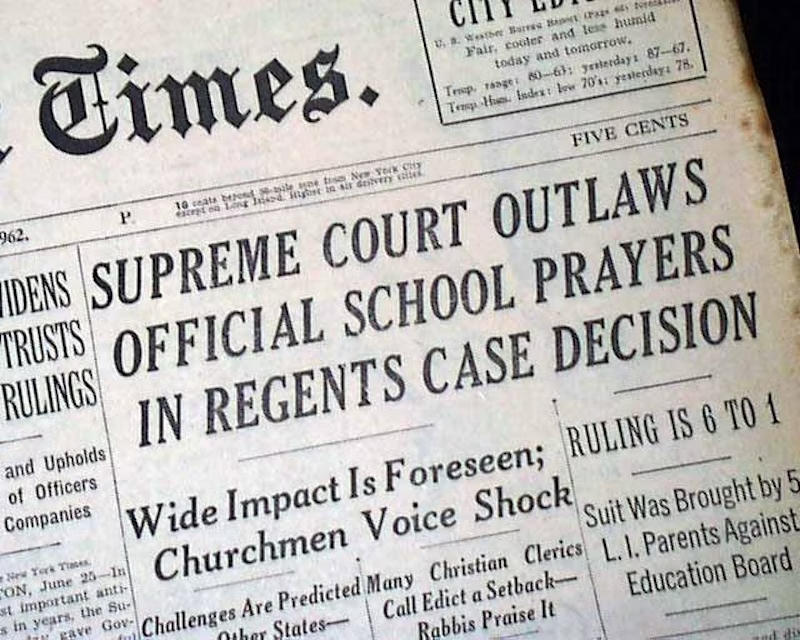<< Hide Menu
3.2 First Amendment: Freedom of Religion
5 min read•june 18, 2024
Jed Quiaoit
Annika Tekumulla
Jed Quiaoit
Annika Tekumulla
Freedoms!
The First Amendment to the United States Constitution is widely considered one of the most important amendments in the Bill of Rights. It guarantees five key liberties to American citizens: freedom of religion, freedom of speech, freedom of the press, the right to peaceably assemble, and the right to petition the government. These liberties are central to American democracy and play a crucial role in protecting the rights of citizens against government interference. 🔑

Source: Society6
We'll dive deeper into three of the most significant liberties of the First Amendment. In this section, we'll talk about freedom of religion.
Religion
Freedom of religion is one of the most important liberties guaranteed by the First Amendment. This freedom protects the right of individuals to practice their religion, or to practice no religion at all, without fear of government retribution. This protection has been important in ensuring that individuals can freely express their religious beliefs without fear of persecution.
For example, in Wisconsin v. Yoder (1972), the Supreme Court held that a state law mandating compulsory high school attendance violated the free exercise of religion of Jonas Yoder, an Amish parent because his religion did not agree with high school attendance.
However, freedom of religion is not absolute. In the landmark case of Reynolds v. United States (1878), the Supreme Court upheld the right of the federal government to regulate marriage and prosecute the practice of polygamy (but, they couldn't regulate religious beliefs about the correctness of polygamy).
Establishment Clause
The Constitution also guarantees that the government can not force individuals to conform to one religion. This is expressed in the Constitution as the establishment clause which states that the government can not set a state religion. This clause has been very important to create the separation of church and state. However, there have been some exceptions like government subsidies for schools with general religious education.
Speech
Freedom of speech is another key liberty protected by the First Amendment. This freedom protects individuals' right to express their opinions, regardless of whether those opinions are popular or unpopular. The freedom of speech is essential to a functioning democracy, as it allows individuals to participate in public discourse and hold the government accountable.
For example, in Tinker v. Des Moines Independent Community School District (1969), the Supreme Court held that students have the right to free speech in school, even if that speech is critical of the government.
Press
Freedom of the press is an important aspect of the First Amendment, as it ensures that individuals can access and disseminate information without fear of government retribution. This freedom has been important in ensuring that the press can report on important issues and serve as a watchdog against government corruption and abuse of power.
For example, in New York Times Co. v. United States (1971), the Supreme Court held that the government could not prevent the publication of the Pentagon Papers, a classified government study of the Vietnam War, as it would be a violation of the freedom of the press.
Peaceful Assembly
The right to peaceably assemble allows individuals to gather together and express their opinions, protest government actions, and advocate for their rights. This right has been important in shaping the political and social landscape of the country and has been used to effect change on a number of important issues.
For example, the Civil Rights Movement of the 1950s and 1960s relied heavily on the right to peaceably assemble, as individuals gathered together to protest segregation and advocate for equal rights. The Supreme Court has held that the government may not restrict this right, as long as the assembly is peaceful.
Petitioning the Government
The right to petition the government allows individuals to voice their complaints and seek redress for grievances. This right has been used to effect change on a number of important issues and has been instrumental in holding the government accountable.
For example, individuals have used the right to petition the government to advocate for changes in law, challenge government actions, and bring attention to important issues. The government is required to respond to these petitions and must take them into consideration when making decisions.
Lemon Test
In order to see if there is a violation of the establishment clause, the court uses the Lemon test. This test was derived from the court case of Lemon v. Kurtzman in 1971. They test whether a state action is a violation by testing 3 parts. 🍋
The action violates the clause unless it:
- Has a significant secular, rather than religious, purpose
- Does not have the effect of advancing or discouraging religion
- Does not have “excessive entanglement” between government and religion
Important Cases: Illustrative Examples
The First Amendment to the United States Constitution provides for two key clauses: the Establishment Clause and the Free Exercise Clause. These clauses are the basis for the ongoing debate over balancing majoritarian religious practice with individual freedom of religion. This debate is reflected in a number of court cases that have shaped the interpretation and application of these clauses. 📷
Engel v. Vitale (1962)
One such case is Engel v. Vitale (1962), which dealt with the issue of school sponsorship of religious activities. This case dealt with a group of Jewish families that sued their children’s school district for having prayer in the classroom. Initially, the New York Court of Appeals upheld the decision of allowing school prayer.
Consequently, the families took the case to the Supreme Court because they believed that the prayer was violating the establishment clause. There was a 6-1 decision that ruled that the school prayer did violate the establishment clause.
In other words, the Supreme Court declared that this law violated the Establishment Clause, which prohibits the government from endorsing or promoting religion. This decision was significant because it established that the government must remain neutral in religious matters and cannot take actions that endorse or promote one religion over another.

Source: Wikimedia Commons
Wisconsin v. Yoder (1972)
Another important case is Wisconsin v. Yoder (1972), which dealt with the issue of compulsory school attendance. This case dealt with the Amish principle that believed the higher education of high school was not necessary to preserve the Amish lifestyle. Wisconsin responded by fining three Amish families that took their children out of school in 8th grade.
The families appealed to the Supreme Court which ruled in favor of the families which led to the state of Wisconsin taking the case to the Supreme Court. The Supreme Court then again ruled in favor of the families stating that taking their children out after the 8th grade was protected by the First Amendment free exercise clause. This clause reserves the right of American citizens to practice any religious faith or ritual.
🎥 Watch: AP GOPO - 1st and 2nd Amendments

© 2024 Fiveable Inc. All rights reserved.